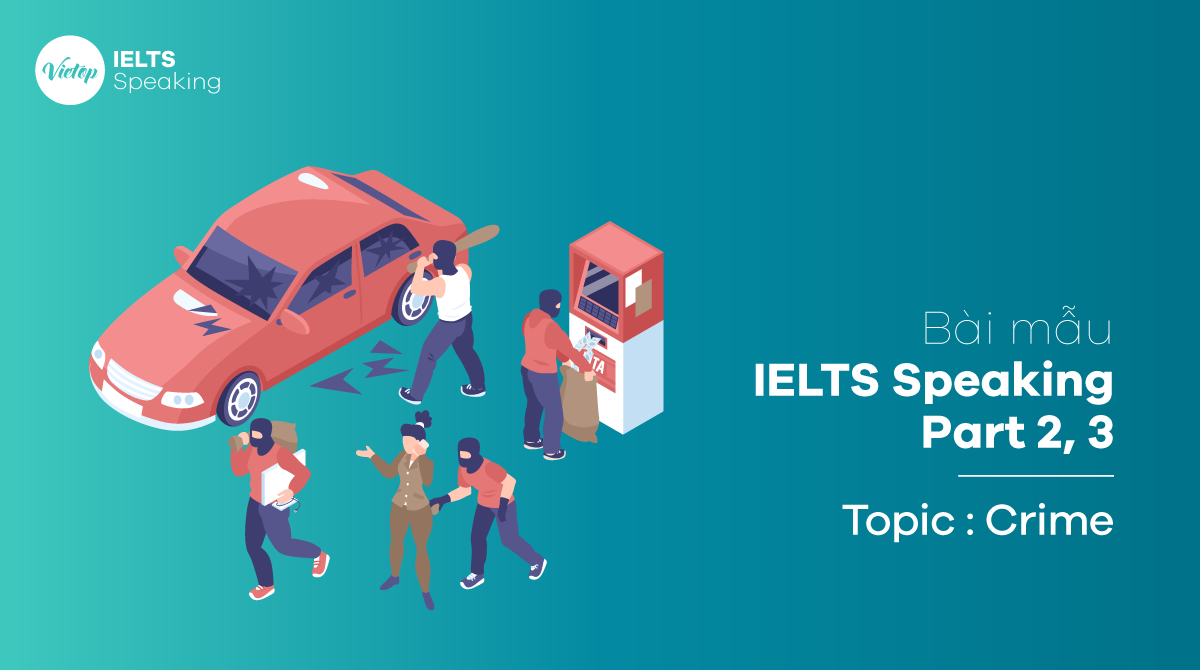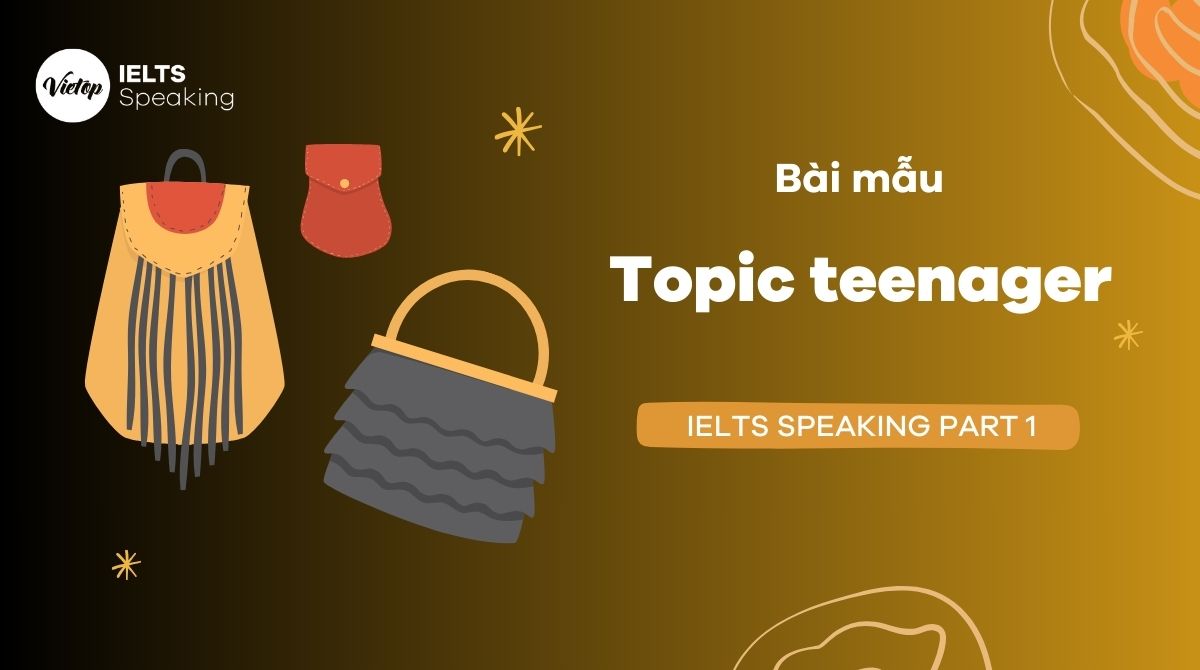Với bài viết hôm nay, Vietop English mời các bạn đến với phần bài mẫu Topic Law and Crime – IELTS Speaking Part 2, 3. Đây là một chủ đề hay gặp nhưng cũng khá “khó ăn” với những từ vựng liên quan đến luật pháp, mời các bạn cùng tham khảo qua nhé!
1. Bài mẫu topic Law and Crime – IELTS Speaking part 2

Mời các bạn nghe Auido – Topic Law and Crime Part 2 tại đây nhé!
Describe a new law you would implement where you live to make it a better place.
You should say:
- what law it will be
- will it be easy to introduce such a new law
- if it will be popular
And explain why you think it would
If we truly want to make the world a better and more peaceful place for ourselves and our children, there is no other option but to introduce and put into place good laws. Of course, some would counter that there are already sufficient laws to accomplish the desired result. Yet I believe that we can continually create more reasonable rules to meet the needs of our society.
The new law that I would like to see implemented in my community is to prosecute poor parents who engage in inappropriate behaviour toward their children, such as domestic violence. These parents would be held accountable and punished, as well as be denied the right to be parents, and their children would be placed in childcare centres to avoid being suffered both physically and psychologically.
The reason for my decision to enact such a law is that, despite living in the modern era, some Asian cultures disregard children’s education, the majority of parents believe that raising children entails feeding them and sending them to school so that they can pursue prestigious careers such as doctors or teachers in the future. However, these people are unaware that they should set a good example for their children – who are more likely to copy such bad behaviours if their parents are unable to manage their emotions, such as venting their anger on the children.
This stereotype has been passed down through many generations, so I don’t expect it to be easy to introduce the new law, but I do hope that it will eventually become common in my society as people have gradually realized the dangers of incorrect child education methods and with the introduction of this law, the role of parenting would be properly evaluated. Aside from that, children will have a more joyful childhood if their parents are not harsh on them and understand their thoughts and decisions.
- To counter (v): chống lại, phản đối
- Sufficient (adj): đủ (= enough)
- To accomplish (v): hoàn thành
- Desired (adj): mong muốn
- Reasonable (adj): hợp lý
- To meet the needs (v): đáp ứng nhu cầu
- Prosecute (v): truy tố
- Inappropriate behaviour (n): hành vi không phù hợp
- Domestic violence (n): bạo lực gia đình
- To be held accountable (v): Chịu trách nhiệm
- The right to be parents (n): quyền làm cha mẹ
- To suffer (v): đau khổ, chịu thiệt hại
- Physically (adv): về thể chất
- Psychologically (adv): về tinh thần
- To enact (v): ban hành
- To disregard (v): xem thường
- To entail (v): bao gồm
- To pursue (v): theo đuổi
- Prestigious (adj): danh giá
- To set a good example (v): làm gương tốt
- To vent one’s anger on somebody/something (v): trút giận lên ai hoặc cái gì
- Stereotype (n): khuôn mẫu (một lối nghĩ nào đó về ai, điều gì hoặc hành động gì)
- To be passed down (v): lưu truyền
- Gradually (adv): dần dần
- Method (n): phương pháp
- Aside from that: bên cạnh đó
- Joyful (adj): vui vẻ (= happy)
- Be harsh on s.o (adj): khắc nghiệt với ai đó
Nâng cao kỹ năng Nghe, Nói, Đọc, Viết toàn diện. Khóa học luyện IELTS 4.0 giúp bạn chinh phục kỳ thi!
2. Bài mẫu topic Law and Crime – IELTS Speaking part 3
Mời các bạn nghe Auido – Topic Law and Crime Part 3 tại đây nhé!
2.1. What do you think the most common crime in your country is?
Pickpocketing, in my opinion, is the most typical crime in my country, which is because law enforcement officers have a difficult time identifying potential suspects until they take action. But when it occurs, it usually appears to be too late. This is quite dangerous for the citizens since not only do people lose personal items but they are sometimes dragged down the street by the criminal, thus they can be seriously injured.
- Typical (adj): đặc trưng
- Law enforcement officers (n): các cán bộ thi hành luật
- Potential (adj): tiềm năng, có khả năng
- To take action (v): hành động
- To occur (v): xảy ra (= happen)
- To be dragged (v): bị lôi đi
- To be seriously injured (v): bị thương nặng
Xem thêm: Khóa IELTS Online – Luyện thi trực tuyến cùng chuyên gia IELTS 8.5
2.2. What do you think makes people commit acts of violent crime?
Crimes, I think, are motivated by a variety of factors. Some people turn to crime in an effort to make some quick cash when they are struggling to support themselves through their jobs. Others are born into criminal families, so it comes naturally to them. For these individuals, committing crimes is not a sin but rather a way of life. As we could see through daily media, some are committed out of desperation, while out there, certain people are killing for sport.
- A variety of: đa dạng
- Cash (n): tiền
- To struggle (v): gặp khó khăn
- To be born into (v): được sinh ra trong (hoàn cảnh nào đó)
- Individuals (n): các cá nhân
- Desperation (n): sự tuyệt vọng
- To kill for sport (v): giết chóc vì thích, không nhằm mục đích sinh tồn, tự vệ
2.3. Do you think that young criminals should be sent to prison for serious crimes?
Most juveniles are too young to understand the consequences of their actions, so putting them in jail for their crimes is unlikely to help them, in my opinion. It is preferable to send them to reformatories or require them to perform community service because doing so allows them to give back to society and increases the likelihood that they will learn from their mistakes.
- Juveniles (n): vị thành niên
- Preferable (adj): thích đáng, phù hợp
- Reformatories (n): các trường giáo dưỡng
- Community service (n): dịch vụ công ích
- Likelihood (n): khả năng
2.4. Do you think that video games encourage young people to commit crimes?
I don’t think video games lead to violence or aggression since there are other hazardous elements contributing to the alarming rate of juvenile wrongdoing such as antisocial behaviour, depression, academic problems or loss of care from parents. If that negative effect of video games was true, we would have to go and censor TV and books, and even change how we report the news – which is impossible.
- Wrongdoing (n): các việc làm sai trái
- Antisocial (adj): chống đối xã hội
- Depression (n): trầm cảm
- Academic problems (n): vấn đề giáo dục
- Loss of care (n): mất đi sự chăm sóc
- Censor (v): kiểm duyệt
Trên đây là bài mẫu IELTS Speaking Part 2, 3 chủ đề Law and Crime. Vietop English hy vọng sau khi tham khảo bài viết trên, các bạn đã có thêm nhiều từ vựng và ý tưởng cho phần thi IELTS Speaking của mình.
Chúc các bạn luyện thi IELTS tốt!









